On Raising Social Security Full Retirement Age, Period Life Expectancy, Racial and Sex Gaps
And potentially kicking off a new comparison series of cause of death rankings
Someone brought this tweet to my attention:

Given this is a tweet, there is a lot unsaid (and not linked).
There is no math here, and she almost definitely does not know any of it. That’s okay, most people talking about this also don’t know.
But there is a legitimate point buried in here, that doesn’t exactly have to do with math, at least not in the way she means.
I will give you the roadmap:
Social Security Full Retirement Age - What it does and does not mean
Social Security program for those who die before retirement
Life expectancy has been rising in general, both from birth and from age 65
Life expectancy vs. age distribution when people actually die
Racial and sex mortality gaps (and other mortality gaps)
1. Social Security Normal Retirement Age
While Nina Turner did not provide any links to any of her claims, I know how to find info.
Morningstar: Lawmakers consider plan to raise Social Security's full retirement age to 70
Sens. Angus King and Bill Cassidy, a Maine independent and a Republican from Louisiana, respectively, are leading a group of lawmakers in a proposal to raise the full retirement age to around 70 from the current 67 and create a sovereign-wealth fund that would help fund Social Security, according to a media report.
Among options being considered are changing the way Social Security calculates monthly benefits to reflect the number of years spent working and paying into Social Security, rather than the existing formula that calculates benefits based on a worker's average earnings over 35 years, according to a report by the news website Semafor, citing two people described as having been briefed on the plan.
So, nobody with an actual name is quoted with any actual info, other than what the full retirement age actually means.
Semafor, if I remember correctly, is a gossip site news site with iffy funding. The guy who wrote the piece there is tweeting about it here. I think a sovereign wealth fund to try to semi-privatize Social Security is a bad idea, but I can write about that a separate time.
In any case, if it’s a real proposal, when they actually propose it, I can address it.
But let us consider what the “full retirement age” for Social Security actually is. It doesn’t set when you’re “allowed” to take Social Security old-age benefits. That’s the minimum retirement age, and that’s 62.
The “full retirement age” is part of a formula to figure out your benefits, and if you start taking Social Security benefits before that age, the total benefit amount is reduced. (If you delay taking benefits until after, up until age 70 under current law, your benefits are actually increased.)
There are some other complicated things involving penalties and taxation if you take benefits early but continue to work.
Yes, it gets complicated. But there is a simple lever in changing the full retirement age, which has happened before. 1983, in fact.
2. What if you die before taking benefits?
Nina Turner seems to think that if the life expectancy is 68, about 50% or more of black men will die before age 70. (We will check that below)
That does not mean there are no Social Security benefits for anybody in your family.
My dad died at age 38, and my mom collected Social Security Survivors Benefits, as a widow, with 3 minor children to take care of (though I was a minor for only a couple years).
Even parents of the person who died might get benefits — if they are dependents of the person who died.
Again, it can be complicated. I am not going to dig into the ins-and-outs here, because I really want to get into the actual death statistics more than the benefits.
But it’s important for people to know that even if somebody never made it to retirement age, relatives who were dependent on that worker’s income may be entitled to Social Security Survivors Benefits. Some people may not know about that, so I’m just saying, look into it if you may be in that situation.
3. Rising Life Expectancy
Given the original tweet was about black men, I’m going to focus on black men for this portion.
I will get into the longevity gap between black men and other groups in a later section.
But black men have had increasing (period and cohort) life expectancy for decades. Yes, there was some stalling out in the 2010s, and there was a huge hit during the pandemic.
I am pulling from a CDC data set found here, which gives life expectancy (period, which means it is based on historical deaths recorded for specific years, and not based on when people were born, which is cohort life expectancy) from birth and age 65. I will plot both.
Here is the trajectory for life expectancy from 1950 to 2017 for black men in the U.S.:
You can see there were ups and downs, and much of this is the sensitivity to increased death rates for young black men at specific periods, which included the mid-2010s.
Even with those bobbles, the period life expectancy from birth for black men increased by 12.8 years from 1950 to 2017, from 59.1 years to 71.9 years.
In the next graph, I will look at the life expectancy (adjusted to add 65 years - so we’re looking at expected age at death, if we’re getting really persnickety) from age 65 instead of life expectancy from birth. That looks far smoother in its trajectory.
Note I started the vertical scale at age 65 here instead of 50, and the first year represented is 1960.
From 1960 to 2017, the life expectancy from age 65 increased 3.7 years, which isn’t as dramatic. But here, where we’re assuming the men are already starting from the age of 65, in 1960 a fewer percentage of black men would have been reaching that age, where many more black men reached that age in 2017.
And we will see that in the next section when we actually look at the age distribution of deaths.
4. When are black men actually dying?
I’ve written about this in other contexts, such as this post from 2018:
June 2018: Russian Retirement Age Raised Past Death? Let Me Actuary-splain...
and this post about something stupid Tucker Carlson did:
I pulled out the distribution of deaths by age in 2019, to show how life expectancy, median age at death, modal age at death, and average age at death — just in 2019, before any pandemic — all related to each other.
In short, there is almost no relationship between these numbers.
For the entire U.S. population in 2019, the mean and median age at death were both lower than the period life expectancy, and all three were way lower than the age at which the greatest number of people were dying (the modal age of death).
Part of this is due to me not even showing you what the age distribution of the people who are still living look like — because the number of people who die are a combination are (the death rate at a particular age) times (the number of people around at that particular age).
The death rate at age 95 is higher than the death rate at age 85, but there are far more people aged 85 available to die. The combination of the rates and the underlying population is what pops out the mean, median, and mode.
The period life expectancy is dependent on the death rates alone, and has no connection to the age structure of the population.
Anyway, I thought you might find a similar graph of deaths for black men in 2019 to be interesting, so here it is:
In this case, the life expectancy is well above the peak of ages for deaths. A lot of this has to do with what the age distribution of the underlying population looks like, which is younger for black men compared to white men, for instance.
5. Mortality Gaps in General
That said, there are mortality gaps by race and sex. Let me show the period life expectancy from birth for black and white men and women:
I will note the sex gap in mortality in recent years is much larger than the racial gap. Early in the 20th century, black women had a life expectancy from birth lower than white men, but they crossed over around 1970.
You can really see the difference when you look at life expectancy from age 65.
To be sure, some of the distinction comes from men having had higher smoking rates, higher drug and alcohol use, and behavioral differences such as that.
I haven’t even added in lines from other racial and ethnic groups, such as Hispanics (who have higher life expectancies than non-Hispanic whites) and Asians.
That’s just using information that is easy to grab from the CDC.
The Society of Actuaries and other groups have done further mortality experience studies looking at longevity differences based on other factors, such as education and income levels, separate from issues of sex and race.
Check out this Tableau visualization, where you can see even pre-pandemic differences that have been found by county stratification by socioeconomic quintile.
As I noted in this week’s podcast episode, in talking through some of the Social Security math:
Social Security was originally sold as a way to prevent poverty among seniors, but then became expanded as a middle-class entitlement. This has led to benefit levels that are not supportable by current taxation levels with the population structure we have.
Higher-earning people like me get the highest benefits… and we tend to live the longest. That’s kind of pricey.
As we need to put Social Security on a sustainable footing, increasing the full retirement age as longevity is generally increasing makes sense. But it can be a blunt instrument in decreasing benefit amounts, instead of rethinking the point of the program in the first place.
To be sure, if someone is not around to need retirement benefits, you need not worry about their poverty, eh?
But it is reasonable to point out that the burden of benefit cuts in Social Security will hit differentially at different income levels. Perhaps something less blunt than changing the full retirement age could be done to make things more sustainable.
And please, not a sovereign wealth fund.







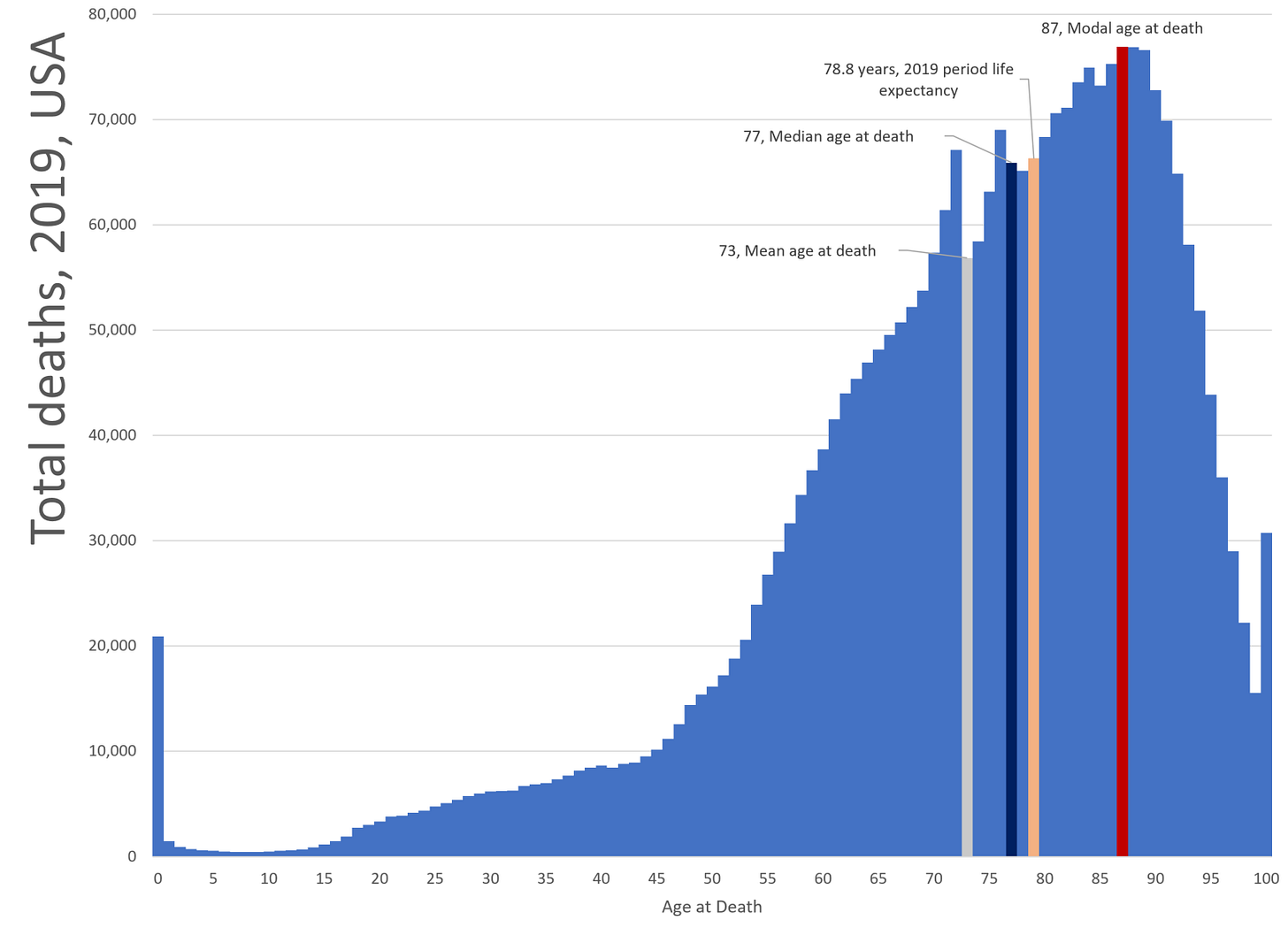
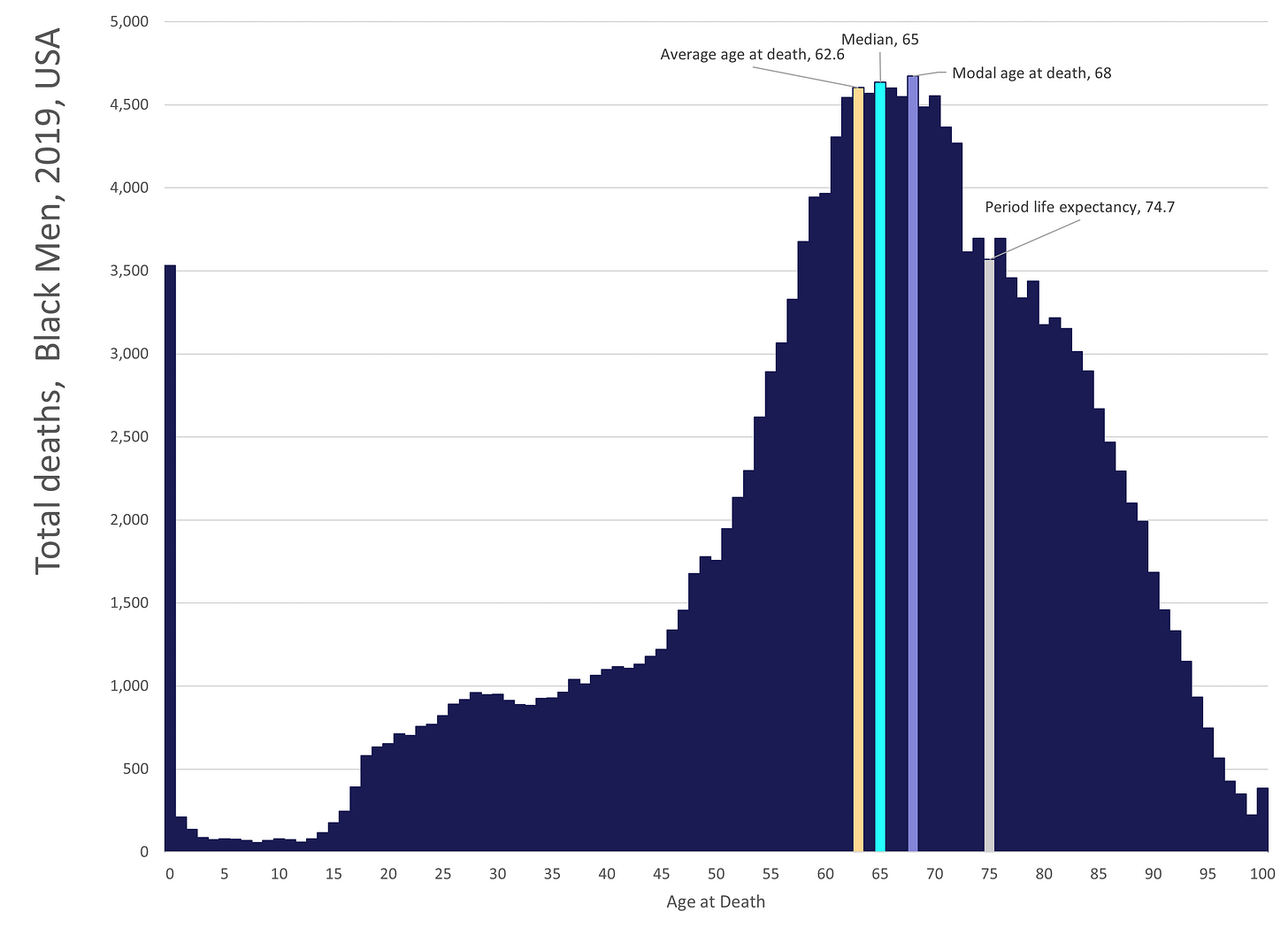
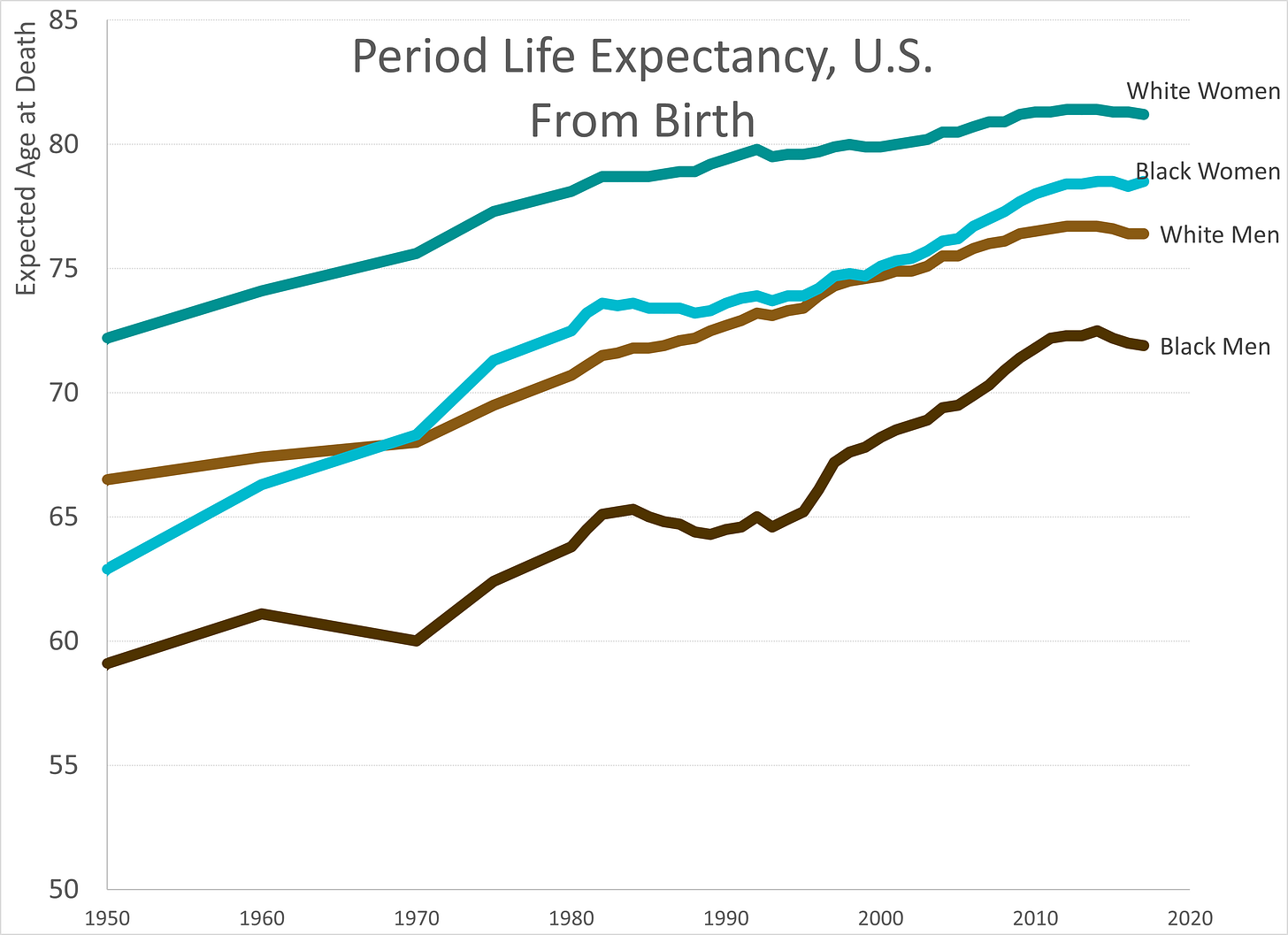
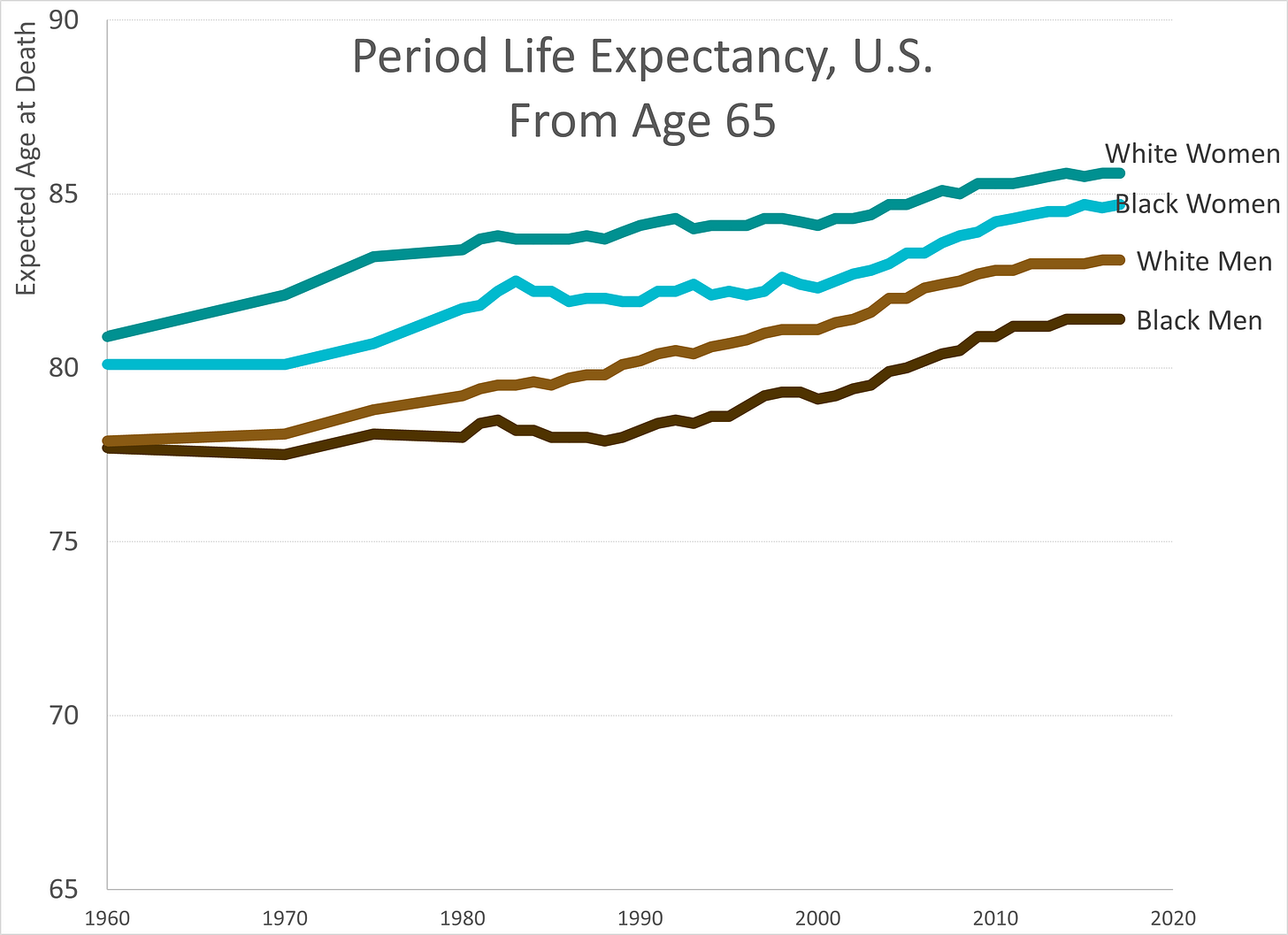
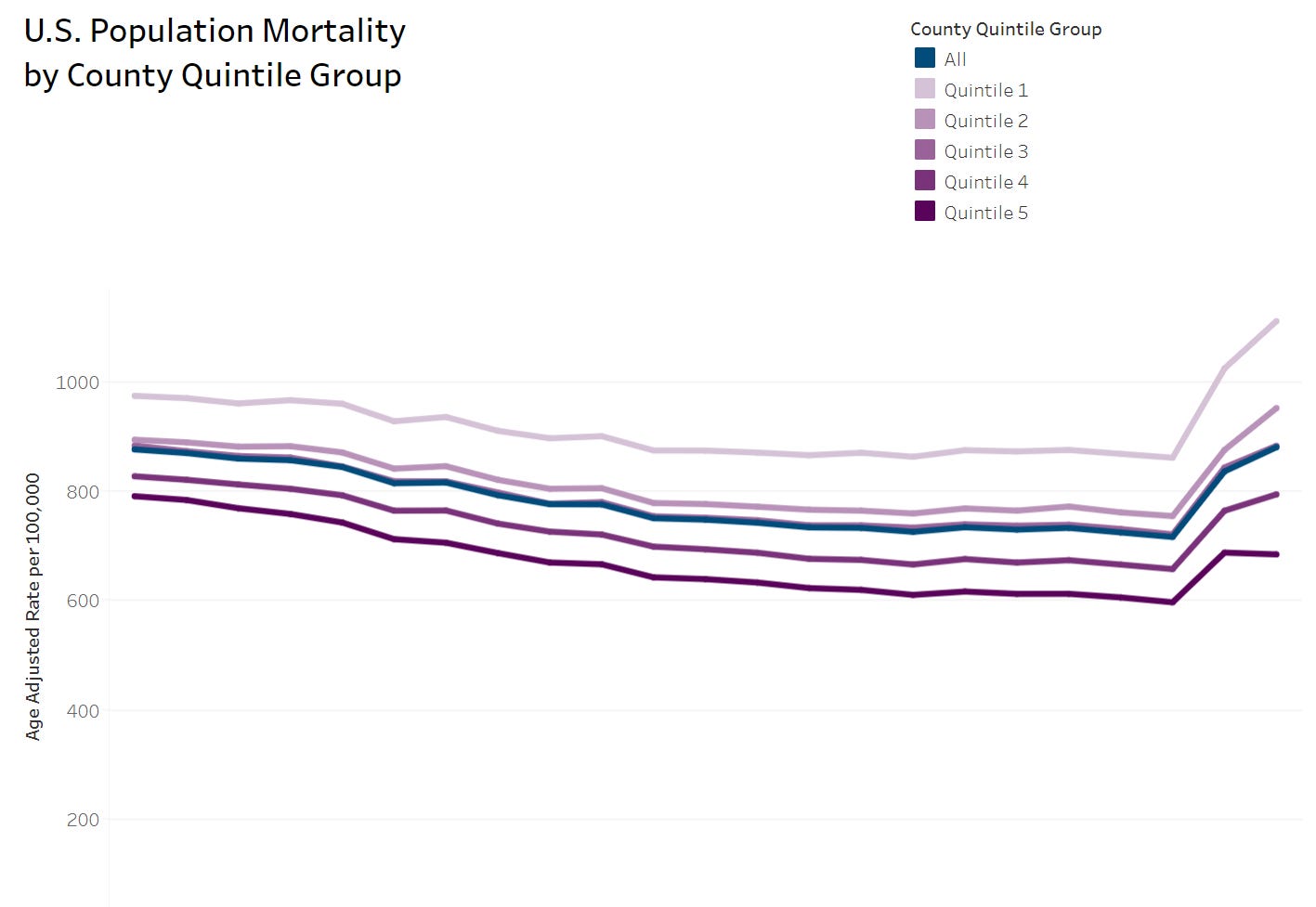
Great work, feel bad she’s getting piled on so hard on Twitter... wish people would learn the art of polite correction...
Anyway when you ran the cohorts by race did you exclude Hispanic and Asian from white people? On mobile and haven’t downloaded the XLS yet.